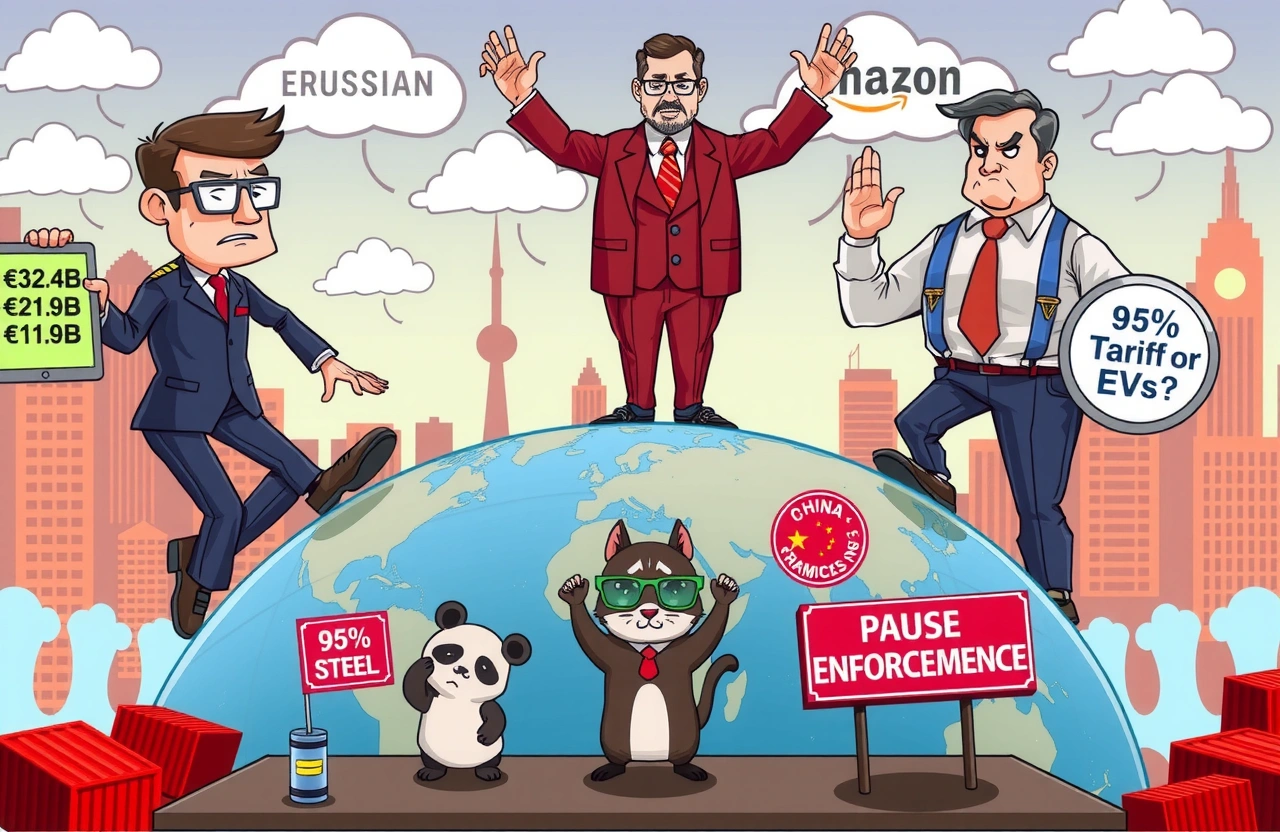The New Frontier in Transatlantic Trade Conflict
Faced with President Trump’s threat to impose 30% tariffs on European goods by August 1st, the European Union is mobilizing a strategic counteroffensive that extends beyond traditional merchandise battles. Brussels is drafting unprecedented retaliatory measures targeting America’s $7.6 trillion services sector—including digital services taxes on tech giants—marking a dangerous escalation in the EU-US trade war. This conflict threatens to spill beyond commodities into the digital economy, risking collateral damage across global supply chains and placing billions in transatlantic commerce in the crosshairs.
Europe’s Retaliatory Roadmap
According to European Commission officials negotiating in Washington, Brussels has assembled comprehensive options including:
- A $840 billion retaliatory tariff package covering US aircraft and industrial goods
- New digital services taxes targeting American tech firms’ advertising revenues
- Export restrictions on scrap steel and specialty chemicals used by US manufacturers
- Synchronized regulations affecting market access for US financial services
Digital Battlefield Emerges
The EU-US trade war escalation has identified digital services as the new frontline, where Brussels seeks leverage against Washington’s perceived aggression. European Commission President Ursula von der Leyen endorsed targeting America’s digital economy, stating: “We can impose tariffs on digital services' advertising revenues—a sector where US companies generate enormous European income that isn’t balanced by reciprocal flows.” This strategic pivot recognizes America’s $100 billion annual services trade surplus with the EU.
Tech Titans in the Crosshairs
The digital tariffs would disproportionately impact major US technology firms with deep penetration in European markets. Bernd Lange, Chair of the European Parliament’s Trade Committee, confirms: “US digital platforms capture over 80% of European online advertising revenue yet contribute minimal corporate taxes”—creating regulatory impetus beyond trade retaliation.
| Targeted Digital Services | US Market Leaders | EU Revenue Exposure* |
|---|---|---|
| Online Advertising | Google, Meta | € 32.4 billion |
| Cloud Computing | Amazon, Microsoft | € 21.9 billion |
| Digital Content | Netflix, Apple | € 11.2 billion |
| *Estimated annual revenues from EU operations | ||
Export Restraints Expand Arsenal
For the first time, EU plans incorporate export sanctions alongside traditional tariffs. Among constrained items:
- Scrap Steel: Europe annually ships 8 million metric tons to US arc furnaces, representing 40% of America’s recycled steel feedstock. Targeted duties could increase remelting costs by 15-20%.
- Chemical Precursors: Export restrictions will be applied to specialty compounds vital for US pharmaceutical manufacturing.
- Technical Certification: Withholding EU regulatory approvals for US-made electronics and industrial equipment.
The European scrap metal restrictions illustrate strategic targeting: steel scraps exported from Europe allow efficient recycling in US electric arc furnaces. Disruption would force mills toward costlier alternatives, increasing carbon emissions contrary to climate goals.
Negotiation Deadlock Deepens
The EU-US trade war escalation unfolds despite intensive diplomatic efforts. EU Trade Commissioner Maroš Šefčovič reported “fundamental divergences” remain following recent Washington talks. German Chancellor Angela Merkel warned: “Our patience isn’t infinite—we’ll answer tariffs proportionally if diplomacy fails.” Europe’s red lines include:
- Capping goods tariffs at 10% instead of Trump’s threatened 30%
- Preserving privileged access for German automobiles facing proposed 25% sector-specific tariffs
- Securing ironclad exclusions for pharmaceutical and semiconductor exports
Diplomatic Countdown
Behind the scenes, Brussels signals willingness for compromise but prepares contingency plans. Von der Leyen’s team drafted proportional response benchmarks:
- Limited agricultural tariffs if US levies under 7%
- Sectoral digital taxes accompanying 15% US tariffs
- Comprehensive services sanctions triggering above 20% tariffs
Economic Ripples Beyond Borders
As the EU-US trade war escalates toward services confrontation, emerging economies face collateral consequences:
- South Korean semiconductor firms rely on EU chemical exports now facing constraints
- Mediterranean shipping hubs anticipate cargo volume contractions
- Currency markets brace for euro volatility affecting carry trades
The global rules-based trading system faces an existential challenge. As WTO Director-General Ngozi Okonjo-Iweala recently cautioned, tit-for-tat tariffs between economic superpowers undermine trust and threaten “enforceable dispute resolution mechanisms.”
Avoiding the Abyss
The current EU-US trade war escalation requires urgent strategic deescalation before August’s tariff implementation deadline. Businesses with transatlantic exposure should:
- Begin stress-testing supply chains against dual customs barriers
- Petition national chambers of commerce to activate Article 25 exemptions
- Consider new accounting provisions for digital service tax liability
The next 30 days represent a crucial firebreak where constructive dialogue could prevent services sector hostilities from sabotaging recovery. History demonstrates trade conflicts are ultimately settled through mutual respect—a principle Brussels and Washington must urgently rediscover.




